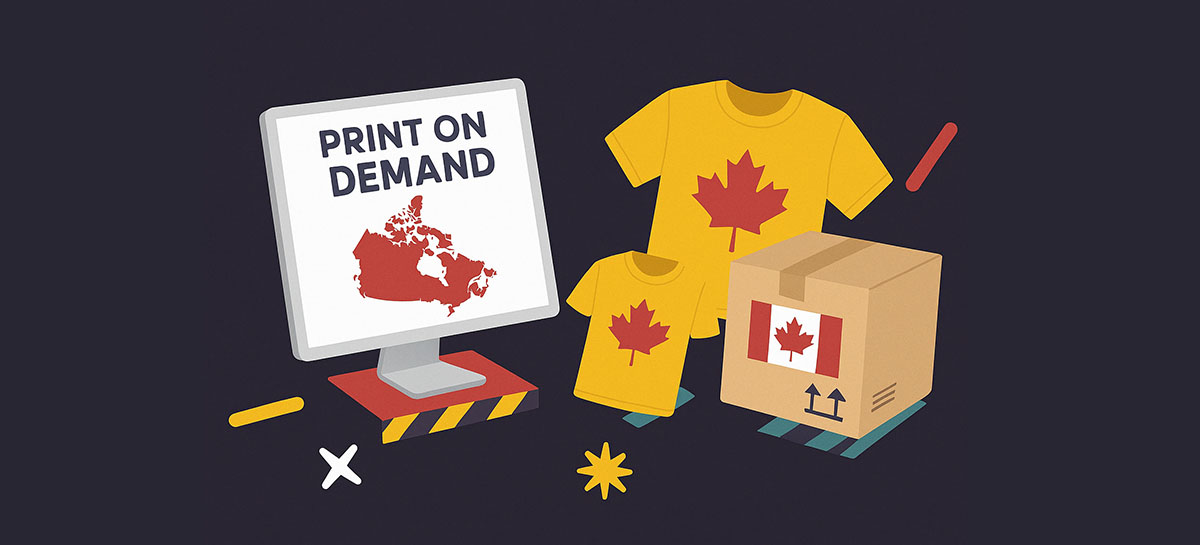When I first looked into print on demand, I figured it’d be easy — upload a few designs, connect it to Shopify, and start making sales.
What I didn’t realise was how much the platform mattered.
Shipping delays, low-quality prints, bad customer support — I learned the hard way that who you choose to work with will make or break your business.
After testing most of the major players, especially ones that ship to or operate in Canada, here’s everything I wish I knew from day one.
Why Print on Demand in Canada Isn’t as Simple as It Sounds
If you’re in Canada or selling to Canadian customers, there’s a lot more to think about:
- Shipping from the US? That means import fees, delays, and unhappy buyers.
- Currency exchange eats into your profit margin if you’re paying in USD.
- Not every platform offers CAD pricing or local fulfillment.
- Some platforms look great on the surface but don’t deliver on customer service.
For me, local fulfillment was the game changer. As soon as I started using platforms that actually printed and shipped from within Canada, returns dropped and reviews improved.
Verdict: Don’t just go with the most popular platform. Go with the one that works in your country.
Quick Comparison: Top Print on Demand Companies in Canada
Here’s a simple side-by-side of what I’ve tested. I go into more detail below.
| Platform | Based In | Local Fulfillment | Best For | Integrations |
|---|---|---|---|---|
| Printful | US (with Canada warehouse) | ✅ Toronto facility | All-round, brand-focused sellers | Shopify, Etsy, etc. |
| Printify | US/Global | ❌ (some suppliers ship to CA) | Budget testing | Shopify, Etsy |
| Gelato | Norway/Global | ✅ Global printing partners | Fast international shipping | WooCommerce, Shopify, Etsy |
| Gooten | US | ❌ | Scaling with automation | Shopify, Etsy |
| Art of Where | Montreal, Canada | ✅ Yes | Canadian artists, handmade feel | Etsy, Shopify |
| Redbubble | Australia/Global | ❌ | Artists who want marketplace traffic | Built-in marketplace |
| Society6 | US | ❌ | Passive income via art sales | Built-in marketplace |
| Printeez | Canada | ✅ Yes | Canadian sellers wanting local POD | Manual, Zapier-style tools |
1. Printful: Best All-Round POD with Canadian Fulfillment
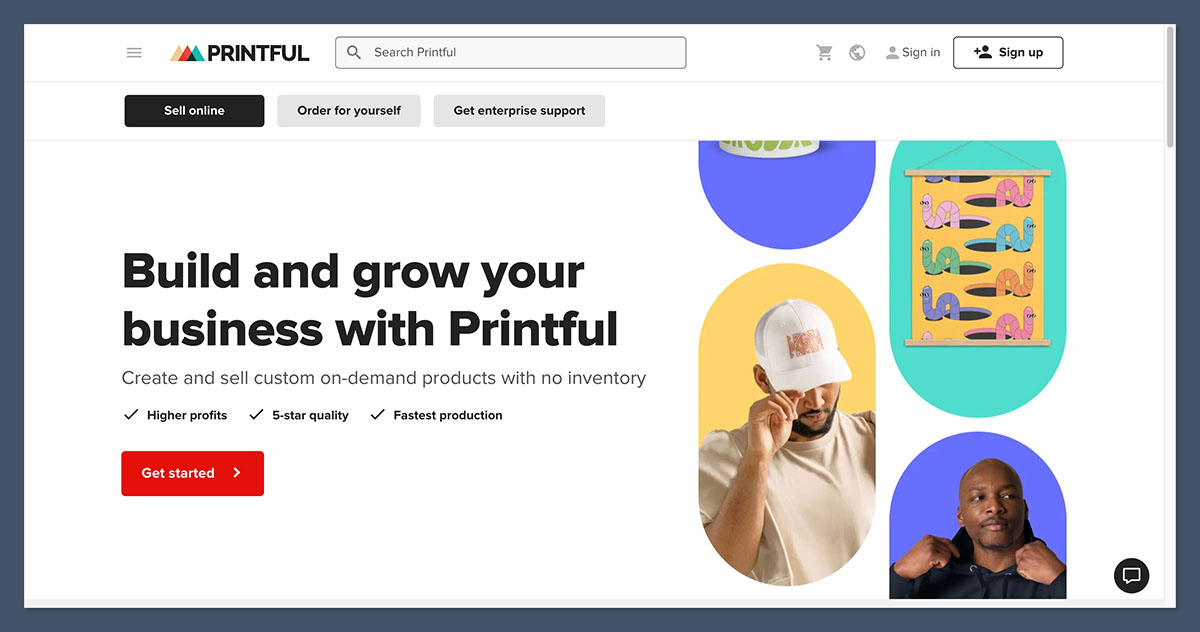
I started with Printful because it’s everywhere — and honestly, it lived up to the hype in some areas.
They’ve got a Toronto facility, which means fast shipping to Canadian customers. That alone saved me a lot of headache.
What I liked:
- Great mockup generator
- Easy Shopify and Etsy integration
- Branding options (custom labels, pack-ins)
- Fast and reliable shipping within Canada
What I didn’t love:
- It’s more expensive than other platforms
- Profit margins are tighter unless you sell premium
- Fewer product options than Printify
Pricing
Printful charges more than most, but the quality backs it up. T-shirts like the Bella+Canvas 3001 cost around $13.95 CAD, plus shipping. Branded options (inside labels, pack-ins) are extra, but you don’t pay monthly fees. You can see the full product pricing before publishing anything.
Shipping in Canada usually lands between $6.50–$9.00 CAD, depending on the product and destination.
Where Printful shines is branding. I’ve sent out test orders with custom packaging and it just feels more professional. It’s not the cheapest option, but if you’re building a premium brand, that’s a trade-off worth making.
Their interface is also one of the cleanest I’ve used. You can create product mockups in minutes, sync with Shopify or Etsy, and push everything live without touching code. For me, that ease of use saved hours.
Verdict: If you care about your brand and customer experience, Printful is the safest bet for Canadian sellers.
2. Printify: Cheapest Option, But Not Canada-Friendly
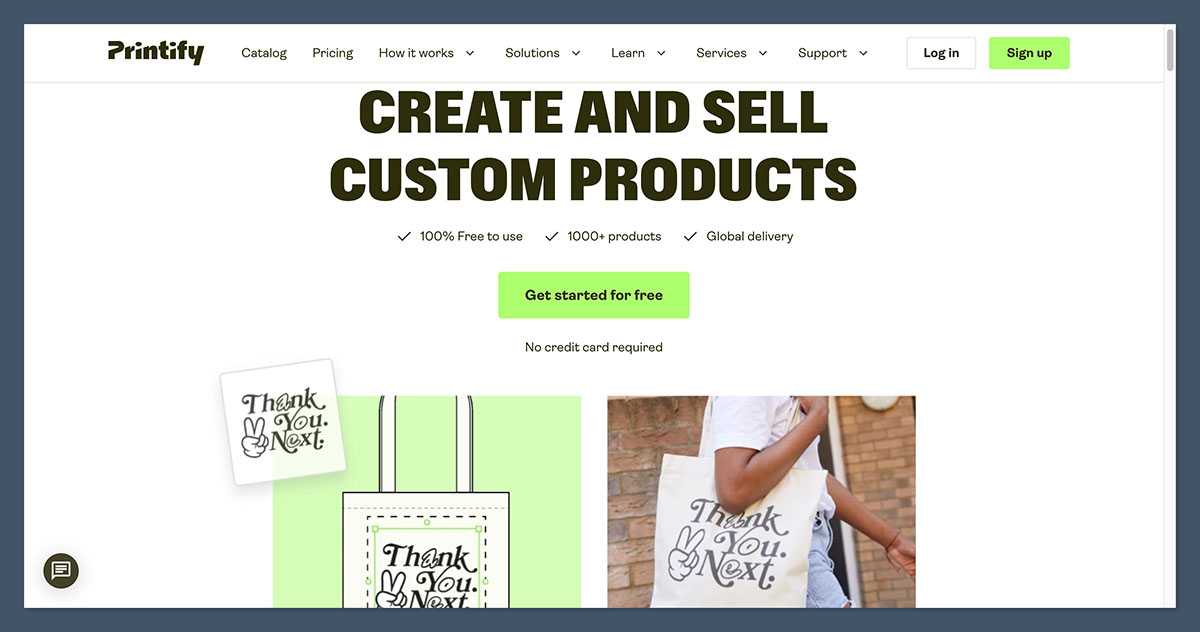
Printify looked great on paper — tons of suppliers, low base costs, and a massive catalog of products.
But here’s the thing: they don’t have a Canadian print partner.
Most of my orders were getting shipped from the US, and my customers were hit with customs fees or long delivery times. Not ideal.
What worked:
- Low prices across most products
- Pro plan gave me decent margin on bulk sales
- Simple integration with Shopify
What didn’t:
- Quality control was inconsistent (depends on supplier)
- No local fulfillment, longer shipping
- Support was hit or miss
Pricing
Printify is one of the cheapest options out there. Basic tees (like the Gildan 5000) can start as low as $7.50 USD (roughly $10.25 CAD). With the Pro plan ($29/month), prices drop even more. But keep in mind: cheaper often means you’re sacrificing on print quality or customer support.
Shipping to Canada ranges from $8 to $14 CAD, depending on the supplier. And because it’s usually cross-border, customs are almost guaranteed.
What threw me off early on was the inconsistency. One customer would get a perfectly printed hoodie, the next would get something faded and off-center. And there’s no Printify customer support that actually fixes it — you have to go through the supplier.
Still, for testing new ideas or building a product catalog on a budget, Printify lets you launch quickly with minimal upfront cost.
Verdict: Great for testing product ideas on a budget — but not my go-to for Canadian customers.
3. Gelato: Surprisingly Fast and Global
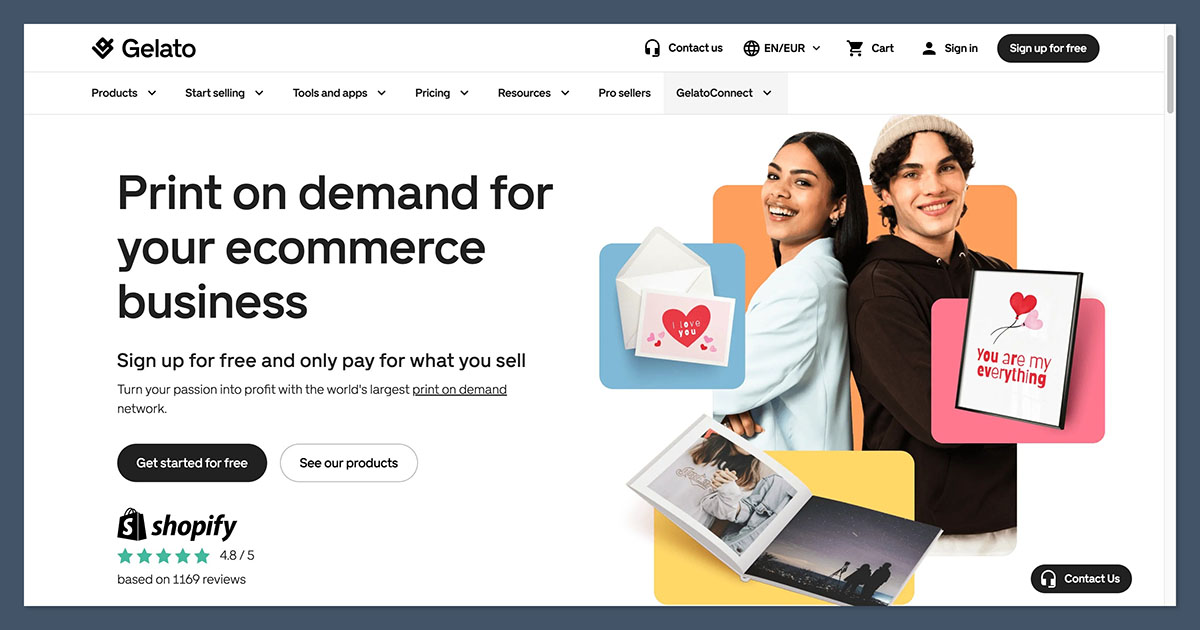
Gelato wasn’t on my radar until I needed to ship internationally.
Turns out, they use local print partners in multiple countries, including Canada.
I was impressed with their turnaround times. Orders to Toronto, Vancouver, and even smaller cities arrived fast, without customs issues.
Here’s what stood out:
- Local printing = fast, no duties
- Clean, simple dashboard
- Supports multiple platforms (Shopify, Etsy, WooCommerce)
- Wide product range: apparel, posters, stationery, mugs
Downsides:
- Not as customizable with branding
- Pricing is mid-range
- Product mockups are basic
Pricing
Gelato’s pricing sits somewhere in the middle. A standard unisex tee like the Gildan 64000 costs around $12.00 CAD, with shipping between $5.50–$7.50 CAD. They don’t charge monthly fees, and you only pay when an order comes in.
They also offer volume discounts once you start scaling. It’s not the cheapest — but the lack of customs delays and fast shipping easily makes up for it if you’re selling to Canadians.
I’ve found Gelato to be one of the smoothest platforms to set up. Their UI is clean, and the automated tax handling is a nice bonus. If you want to offer global shipping without worrying about international logistics, it’s a quiet powerhouse.
The only thing that might hold you back is the lack of branding options. If you care about branded packaging, you’ll want to look elsewhere.
Verdict: If you’re selling globally but want smooth fulfillment in Canada, Gelato is worth a look.
4. Gooten: More for Advanced Sellers
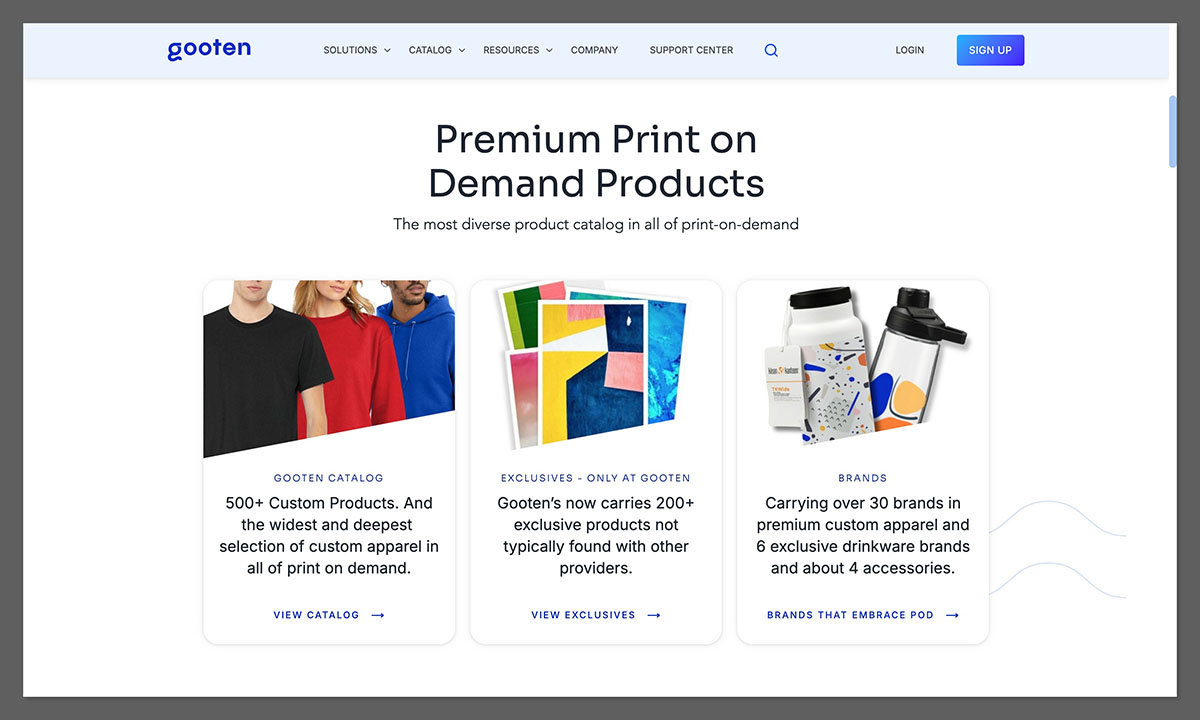
I tested Gooten when I wanted to automate parts of my business — it’s built for volume.
But it’s not built for beginners. The interface isn’t as friendly, and support is mostly focused on businesses already doing decent numbers.
Pros:
- Solid API and automation features
- Bulk order handling is efficient
- Good reliability once it’s set up
Cons:
- Steeper learning curve
- No Canadian fulfillment
- Less creative control over products
Pricing
Gooten doesn’t have public-facing prices — you need to create an account. But generally, t-shirts start around $10–12 USD (approx. $13.50–16.00 CAD), and shipping to Canada is typically $9–13 CAD, depending on product type and supplier.
They don’t charge monthly fees, but they also don’t offer a lot of flexibility unless you’re pushing decent volume.
What I found frustrating was the UI — it feels built for developers or high-volume stores. It’s powerful, but it takes time to learn. Gooten does offer useful data and automation tools if you’re scaling up, but for new sellers, it’s easy to feel lost.
On the upside, once I had things set up, orders were handled fast and reliably. There were fewer errors than Printify, and fulfillment was consistent, even if it wasn’t local.
Verdict: Gooten is powerful but only if you’re scaling. Not ideal for first-time sellers.
5. Art of Where: Canadian, Handmade, Slower
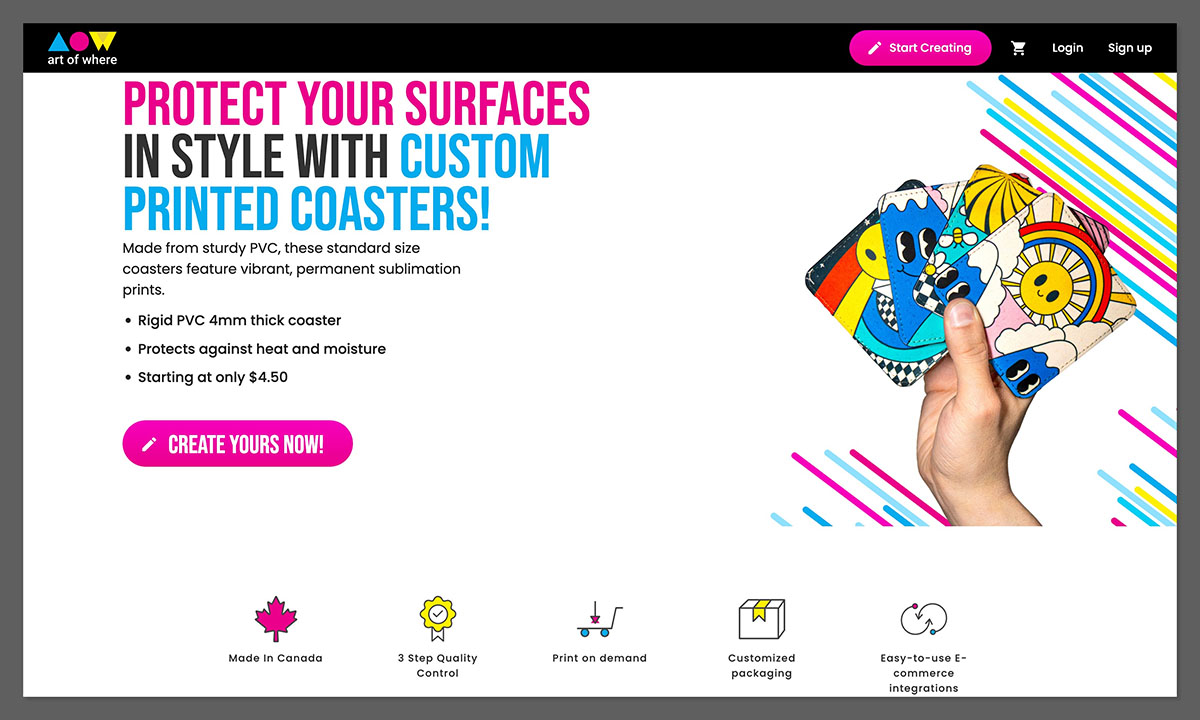
Based in Montreal, Art of Where is actually Canadian — one of the few on this list.
Their whole thing is handmade, in-house production.
They even do notebooks, sketchbooks, and leggings printed right in Canada.
What I liked:
- Made-in-Canada products (helps with marketing)
- Print quality is solid
- Unique product range you won’t find elsewhere
What I didn’t:
- Production times are longer than Printful or Gelato
- Limited integration options
- Higher costs
Pricing
Expect to pay a premium. A standard t-shirt can run about $18–22 CAD, and shipping adds $8–10 CAD, depending on weight and destination.
But everything is printed and shipped from Montreal, so customers get it relatively fast and without duties.
They also offer more unique products, like custom notebooks, pencil cases, beanies, and scarves, which many other platforms don’t. That’s great if your store leans into artistic or handmade vibes.
The downside is speed. Since they handle everything in-house, fulfillment can take longer — 5 to 7 business days before it even ships. That delay makes it tough if your customers expect fast delivery.
But the handmade touch does show. My sample orders were clean, carefully packed, and the fabrics felt higher-end than what I got from other platforms.
Verdict: Great for artists or niche brands who want the Canadian-made label — but not built for speed.
6. Redbubble: Easiest Passive Option, But No Control
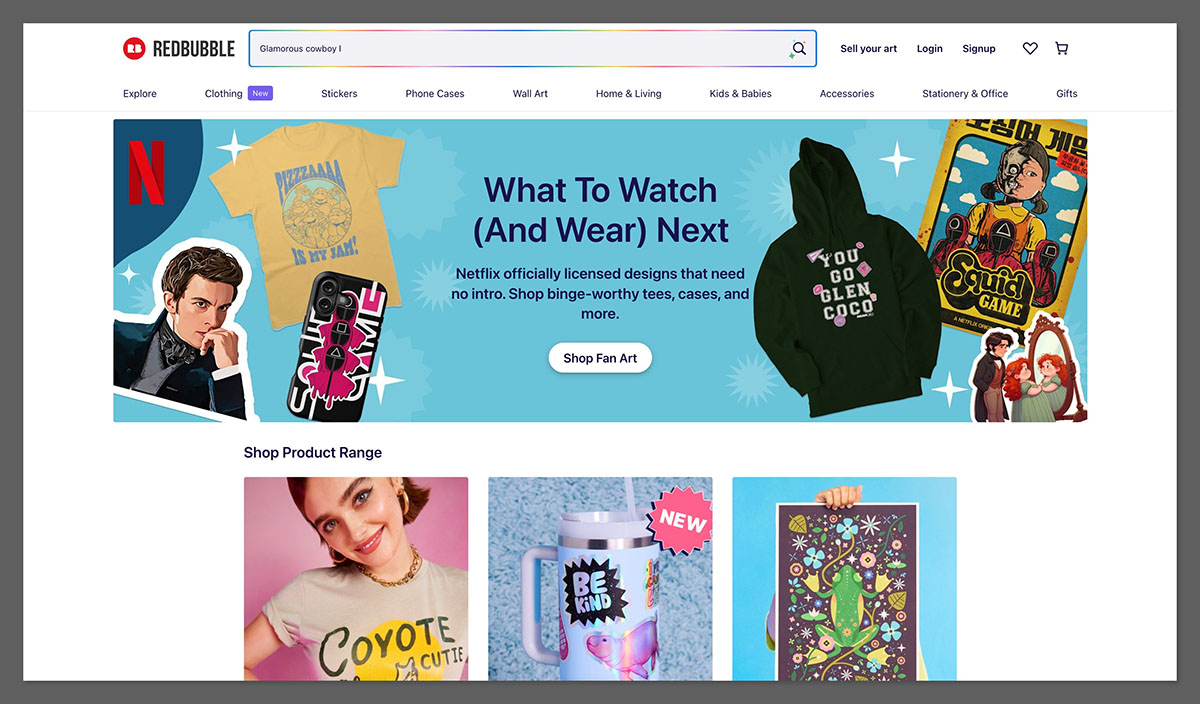
Redbubble was the first platform I ever used for selling art.
I didn’t need a website, didn’t worry about fulfilment, and they already had traffic coming in.
That made it super appealing as a beginner.
It’s more of a marketplace than a POD platform — your products live on Redbubble, and they take care of everything from printing to shipping.
But here’s the catch: you give up a lot of control.
What worked:
- Free to join, no upfront cost
- They handle customer service, production, returns
- Built-in marketplace gets you traffic
- Huge catalog of products — from stickers to wall art to furniture
What didn’t:
- Low profit margins (they take a big cut)
- No customer data, so you can’t build a list or retarget
- No real branding options
- You’re one of thousands of sellers
Pricing
You don’t set the product base prices — Redbubble does. You set your markup, which is your cut. The default is 20%, but you can adjust it.
A standard t-shirt might sell for $28 CAD on the site. You’ll make around $5–6 CAD on that if you stick with 20%.
Shipping to Canadian customers is decent — they’ve got print partners here — but timelines can still vary. Most of mine arrived in about 7–10 days.
What I’ve learned: Redbubble is a great place to put your designs and forget about them. I still get the occasional payout from designs I uploaded years ago. But if you’re serious about building a brand or maximising revenue, it’s too limited.
Verdict: Great for passive, low-maintenance income — but not for serious brand builders.
7. Society6: More Premium, But Even Less Control
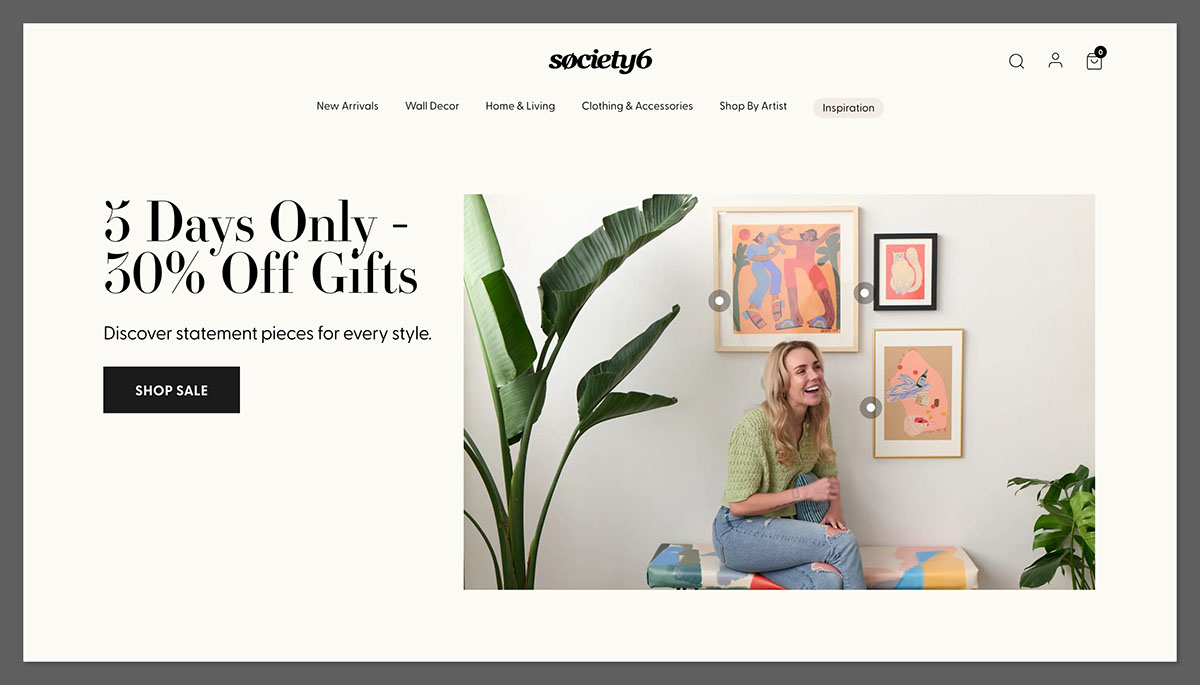
Society6 is similar to Redbubble — you upload designs, they handle everything. But the product lineup and style is a bit more upscale.
Think framed wall art, home decor, furniture, and premium stationery.
It caters more to an “interior design” audience than apparel shoppers.
What worked:
- High-quality mockups and product styling
- Great for wall art and home decor
- Customers expect to pay more, so average order value is higher
- They market the platform hard — emails, social, influencer campaigns
What didn’t:
- Your earnings are even lower than Redbubble on some products
- Super competitive — it’s hard to stand out
- You don’t own the customer relationship
- No branding or packaging options
Pricing
Again, Society6 sets the base prices. You earn a fixed royalty — usually 10% of the sale price on most products. You can set higher royalties on art prints and canvases.
A canvas might sell for $120 CAD, and you’ll make $12 CAD.
Standard t-shirts run around $35 CAD, which leaves you with $3–4 CAD earnings per unit.
Shipping to Canada depends on the item, but large items can take up to 2 weeks. They use multiple fulfillment partners — some international.
What I liked is the design presentation. Your product pages look great, and the built-in traffic is real. But again, you’re leasing space on someone else’s platform.
Verdict: Good if you’re an artist with high-quality work and you don’t want to deal with fulfillment — but don’t expect to build a real business here.
8. Printeez: Local POD with a Canadian Focus
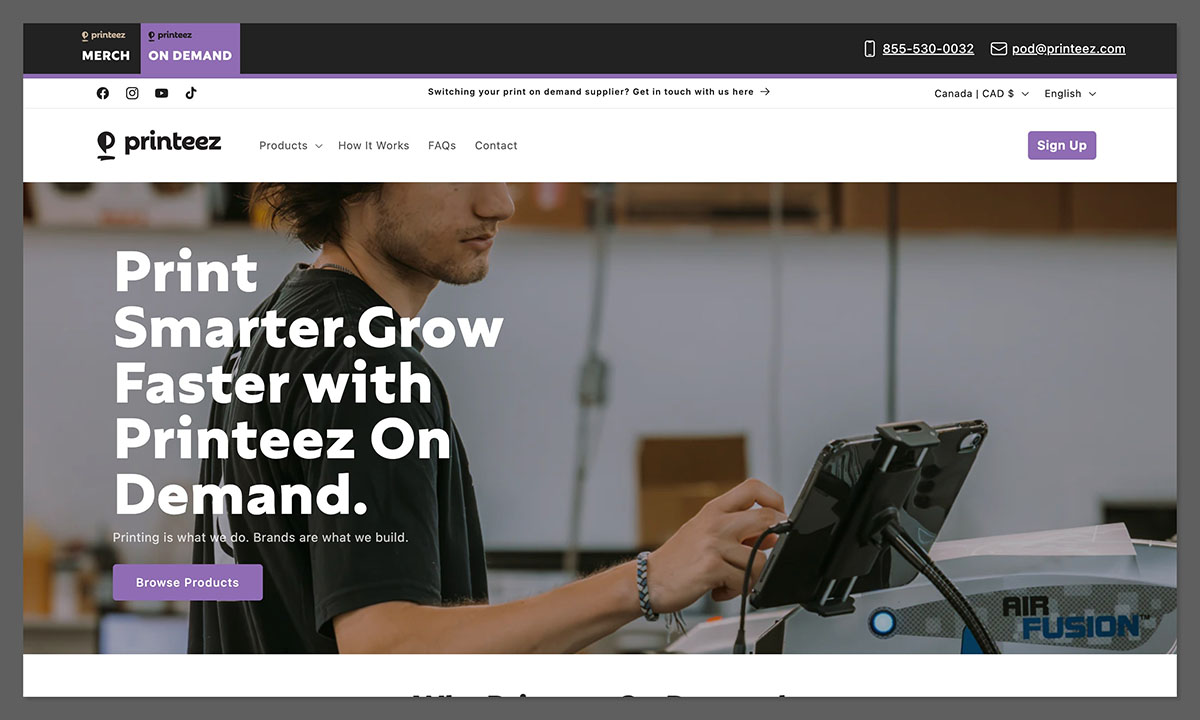
Printeez is one of the newer players on the scene, but what caught my eye is that they’re based in Canada. That’s rare.
They focus on serving Canadian entrepreneurs, with a straightforward interface and a tight product lineup — mostly apparel, tote bags, hats, and mugs.
What worked:
- Canadian-owned and operated
- Fast shipping across Canada (tracked)
- Good base pricing
- Great customer service — fast responses, local team
- White-label option available
What didn’t:
- Limited product catalog (compared to Printify or Printful)
- Branding options still in early stages
- No native integrations — you have to use manual ordering or Zapier-style tools
Pricing
T-shirts start around $12.99 CAD (Gildan Softstyle), with shipping from $6–8 CAD depending on destination. Hoodies are about $28–32 CAD, and mugs around $10–12 CAD.
There’s no monthly fee, and you only pay per order. They also offer bulk pricing discounts if you’re moving decent volume.
What I noticed right away was the customer support. I had a test order go missing, and they replied within an hour and sent a replacement — no hassle. That level of service is hard to find with overseas platforms.
Their dashboard is simple — not flashy — but it works. It’s clear they’re still growing, but for a Canadian-based POD partner, Printeez punches above its weight.
Verdict: A solid Canadian-first POD partner if you don’t need 500 product options. Good for stores that want reliable, local fulfillment and support.
FAQs
Is print on demand profitable in Canada?
Yes — if you price right and use a platform with low shipping costs and fast delivery. Local fulfillment helps.
Which POD company has the fastest shipping in Canada?
Printful (with their Toronto facility) and Gelato (via local printers) were the fastest in my experience.
Do I need a business license to start POD in Canada?
Not to start — but once you’re making regular sales, it’s smart to register a business.
Can I sell on Etsy or Shopify with these platforms?
Absolutely. Most integrate directly with both.
Final Thoughts
Picking the right POD platform isn’t about finding the “best” one — it’s about finding the best one for your goals.
I wasted weeks trying to make the wrong one work. Don’t do the same.
Start with one that fits your needs, run a few test orders, and go from there.
